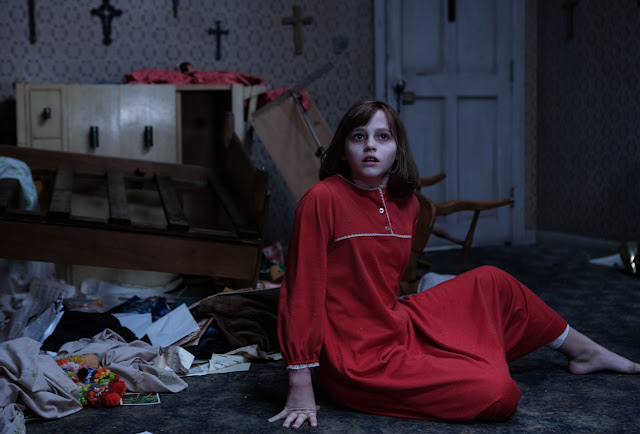"An
intense and wicked tale of what went wrong between mommy and her sons.”
Mommy is not anymore who she was and her twin sons are not
happy about it. Goodnight Mommy
(German: Ich she Ich she), Austria’s
official entry for the Best Foreign Language Film at the 88th Academy Awards and the debut feature of rising duo Veronika Franz and Severin Fiala, is
an insidious and haunting tale of a mother-and-son love gone awry and nasty.
The film opens with a clip of the Von Trapp children and
their stepmother singing a lullaby. It then cuts and takes us into a lush,
green cornfield where ten-year-old twin brothers Lukas and Elias (Lukas and
Elias Schwarz) are running around in a game of tag. It is outside their
isolated and austere Austrian home and in the midst of their game, they
discover something out there in the woods.
Later, their mother (Susanne Wuest), a known TV personality,
returns home from an extensive facial surgery. Looking like a mummy from all
the bandages wrapped around her face, mommy seems a completely different
person. Once loving and tender, she is now cold and strict with her new house
rules on keeping silence and the curtains closed while she recovers. She also
prepares only one set of clothes and breakfast for them. Accidentally, the boys
discover a strange photo of her with a woman who looks and dresses similarly
with her. As mommy’s bandages come off, she looks a little different than
before. Taking the matters into their hands, the twins tie her up in bed and
demand to know where their real mother is.
Goodnight Mommy
is one of the year’s most unsettling and sinister horror films. It is
masterfully written and efficiently executed. It is filled with subtly eerie
visuals that match its tender forebodings and spine-tingling twists. Unlike
most movies in the genre, it does not rely on cheap tricks to bring fright and
chills. Instead, it balances the emotional, psychological and physical
violence, all escalating at each passing moment, to maximize the tension.
Nonetheless, familiar horror tropes involving roaches, a visit to the woods or
graveyard tombs, and simple yet malevolent torture methods are still present.
The film is deliciously wicked with how it toys with
audience’s loyalty. It is difficult who to root for as neither mommy nor the
boys are behaving reasonably. The film also shifts point of view midway, making
any form of allegiance a guilty feeling. Initially, suspicions are being fed
up against mommy such as a glimpse of her bloodshot eye in the mirror as she
changes bandage, ominous shots of her watching the twins from behind windows or
doors, removal of every photograph of her sons’ father, and even her inability
to identify “mama” in their game of “Who am I”. In effect, the brothers develop
some weird dreams about her.
But as the boys delve deeper into the mystery, they also
become a little too nasty, aggressive and physically menacing. Worse, the film
projects a cringe-inducing elements into their ostensibly kid’s stuffs like
playing hide-and-seek in the cornfield, jumping on a trampoline and sneaking a
stray cat. The film’s final act is a litmus paper for the audience’s resolve.
When all the pieces finally fit together and an overwhelming logic is found
after all the madness, it is even harder to identify to whom greater sympathy is to be
given. Will it be to the twins who are haunted by guilt? Or to mommy who is
limited by personal tragedies?
Other technical aspects of the movie also exaggerate any
sense of danger such as the striking contrast between the antiseptically white
house and the vibrantly colourful outdoors, and the interplay between silence
and suspenseful, as well as shocking, musical scores. A little humor and an
extra pound of tension are added by the appearances of other characters like
the local priest and the two Red Cross charity collectors.
With intense emotional manipulation and dauntingly raw
body-horror, Goodnight Mommy is a
powerful exploration of a strong mother-child bond spiritually damaged by
unforgiving heartbreaks. It has lingering effects, both by its disturbing visuals
and its heart-rending narrative.
Production company: Ulrich Seidl Film Produktion
Cast: Susanne Wuest, Lukas
Schwarz, Elias Schwarz, Hans Escher, Elfriede Schatz, Karl Purker, Georg
Deliovsky, Christian Steindl, Christian Schatz, Erwin Schmalzbauer
Director-screenwriters:
Veronika Franz, Severin Fiala
Producer: Ulrich Seidl
Director of photography:
Martin Gschlacht
Production designers:
Johannes Salat, Hubert Klausner
Costume designer: Tanja
Hausner
Music: Olga Neuwirth
Editor: Michael Palm

























0 comments:
Post a Comment